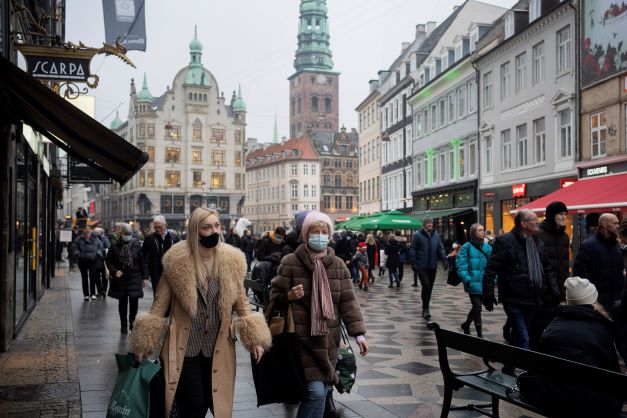WHO warn over half of Europe could be infected with coronavirus soon

By Marc Santora
LONDON — More than half of people in Europe could be infected with the Omicron variant of the coronavirus in the next six to eight weeks, the World Health Organization (WHO) warned Tuesday (11), amid “a new west-to-east tidal wave sweeping across the region”.
“The region saw over 7 million cases of COVID-19 in the first week of 2022, more than doubling over a two-week period,” Hans Kluge, the agency’s regional director for Europe, said at a news conference.
While coronavirus vaccines remain remarkably effective at preventing severe illness and death, the agency cautioned against treating the virus like the seasonal flu, since much remains unknown — particularly regarding the severity of the disease in areas with lower vaccination rates, such as Eastern Europe.
The WHO has cautioned for months that booster shots could worsen vaccine equity around the world, but Kluge said Tuesday that they would play an essential role in protecting the most vulnerable people from severe disease and should also be used to protect health workers and other essential employees, including teachers.
Since Omicron was first detected in late November, it has torn across the planet at a pace unseen during two years of the pandemic. As friends, co-workers and family members test positive, the reality that the virus is moving quickly and widely has been a defining feature of this wave of infection.
But the steep rise that Kluge cited, based on forecasts by the Institute for Health Metrics and Evaluation, is a stark paradigm shift. Although the institute’s models have frequently been criticized by experts, it is clear that the virus is spreading quickly. Even if many people avoid severe illness, the virus promises to cause societal disruption across the continent.
While much of the public discussion has revolved around whether this was the moment when governments should shift policies and restrictions to treat the coronavirus as an endemic disease — removing most restrictions and allowing people to manage risk in a way similar to the way they do with influenza — the WHO said it was too early to call this virus endemic.
Catherine Smallwood, a WHO senior emergencies officer, said that one of the key factors in declaring the virus to be endemic was some sense of predictability.
“We are still ways off,” she said. “We still have a huge amount of uncertainty.”
Kluge added that there were simply too many unknown factors, including exactly how severe omicron is for unvaccinated people and how high the risk is of infection leading to “long COVID” symptoms.
“I am also deeply concerned that as the variant moves east, we have yet to see its full impact in countries where levels of vaccination uptake are lower, and where we will see more severe disease in the unvaccinated,” he said.
Nations in the Balkans and Eastern Europe, where omicron is just starting to spread widely, have much lower rates of vaccination than those in Western Europe.
Despite the widespread level of infection, Kluge cited data from Denmark suggesting how effective vaccines remain. The hospitalization rate for unvaccinated people in the latest wave was “sixfold higher than for those who were fully vaccinated in the week over Christmas,” he said.
“Allow me to reiterate that the currently approved vaccines do continue to provide good protection against severe disease and death, including for omicron,” he said. “But because of the unprecedented scale of transmission, we are now seeing rising COVID-19 hospitalizations. It is challenging health systems and service delivery in many countries where omicron has spread at speed and threatens to overwhelm in many more.”
He added: “For countries not yet hit with the omicron surge, there is a closing window to act now and plan for contingencies.”
One of the central struggles of governments across Europe has been trying to keep schools open, and Kluge described those efforts as essential.
“Schools should be the last places to close and the first to reopen,” he said, although he added that “the numbers of infected people are going to be so high in many places that schools in many countries are going to be unable to keep all classes open” because of illness and staff shortages.
An example of that pressure was apparent this week in France, where 10,452 classes were cancelled Monday (10), according to the government. Prime Minister Jean Castex said that going forward, schoolchildren in the country would be allowed to do self-tests instead of PCR tests if one of their classmates tested positive, in an attempt to keep the education system functioning.
“If we were to shut down classes as soon as there is one first case, bearing in mind the explosion of omicron, all French schools would be closed in a matter of days,” Castex told France 2 television.
But as countries consider shortening isolation periods for people who test positive to limit the effect on essential services, Kluge said that “any decision to shorten recommended quarantine or isolation periods should be taken in combination with negative COVID-19 tests and only when considered essential to preserve critical service continuity.”
-New York Times

